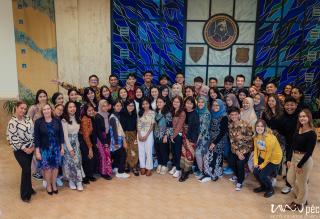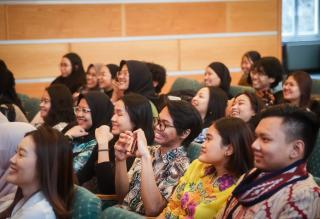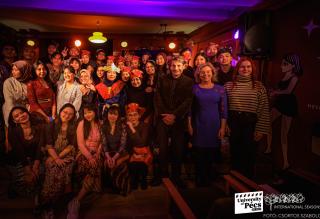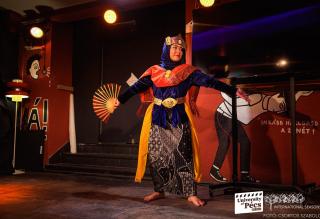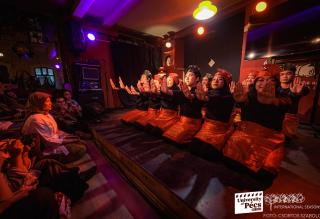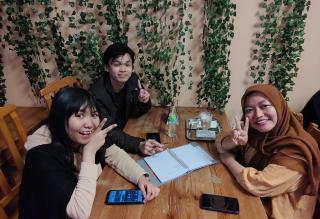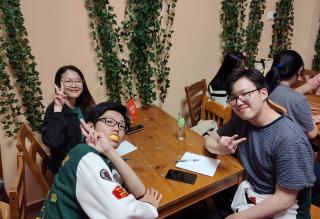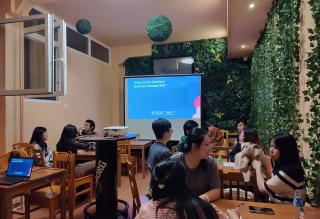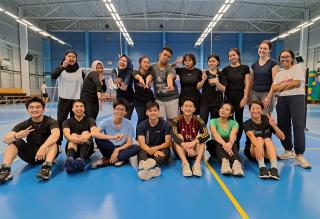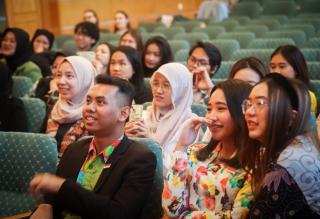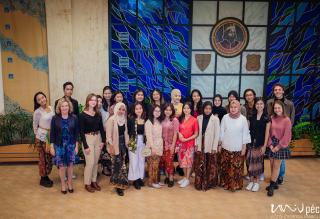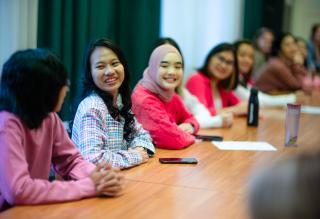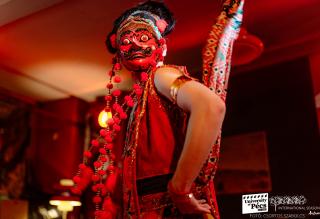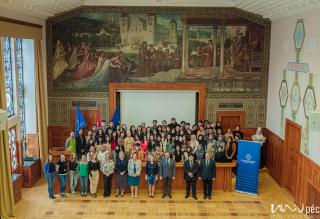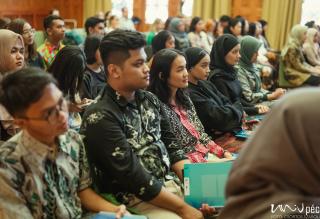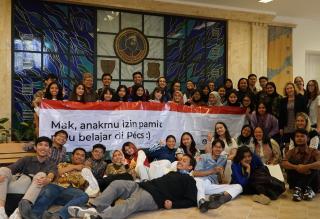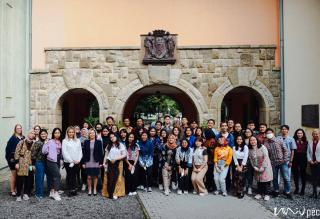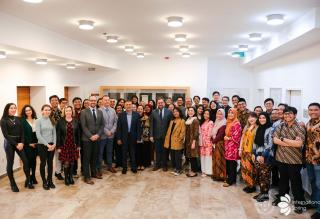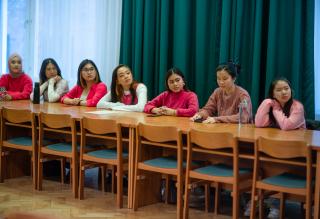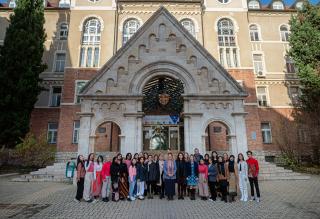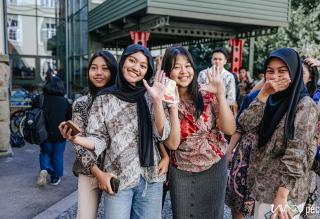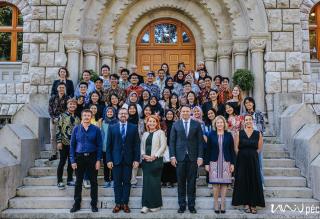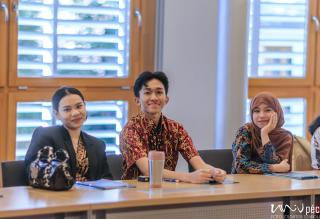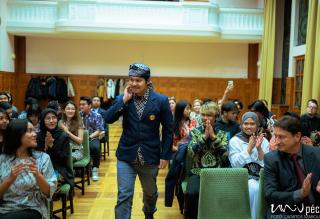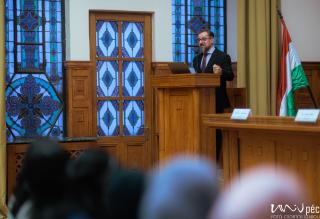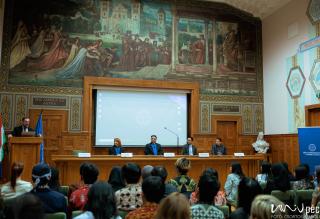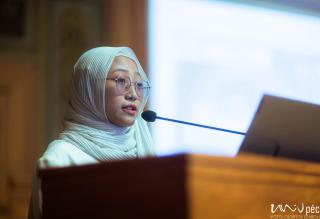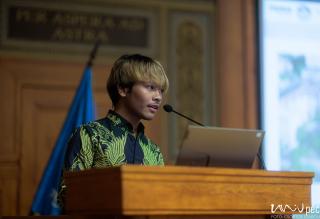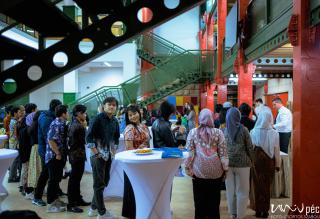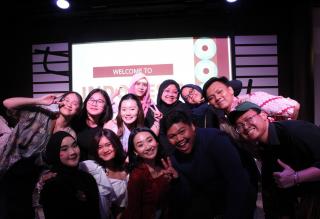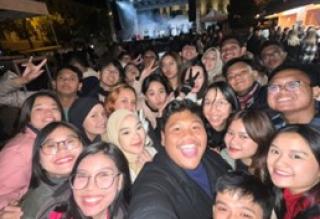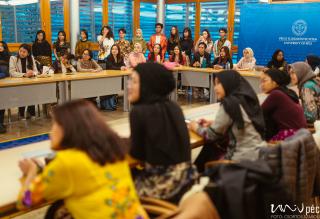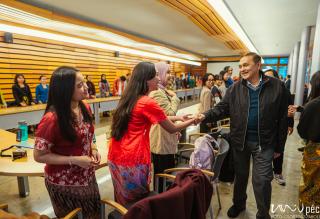INDONESIAN INTERNATIONAL STUDENT MOBILITY AWARDS - Vocational programs
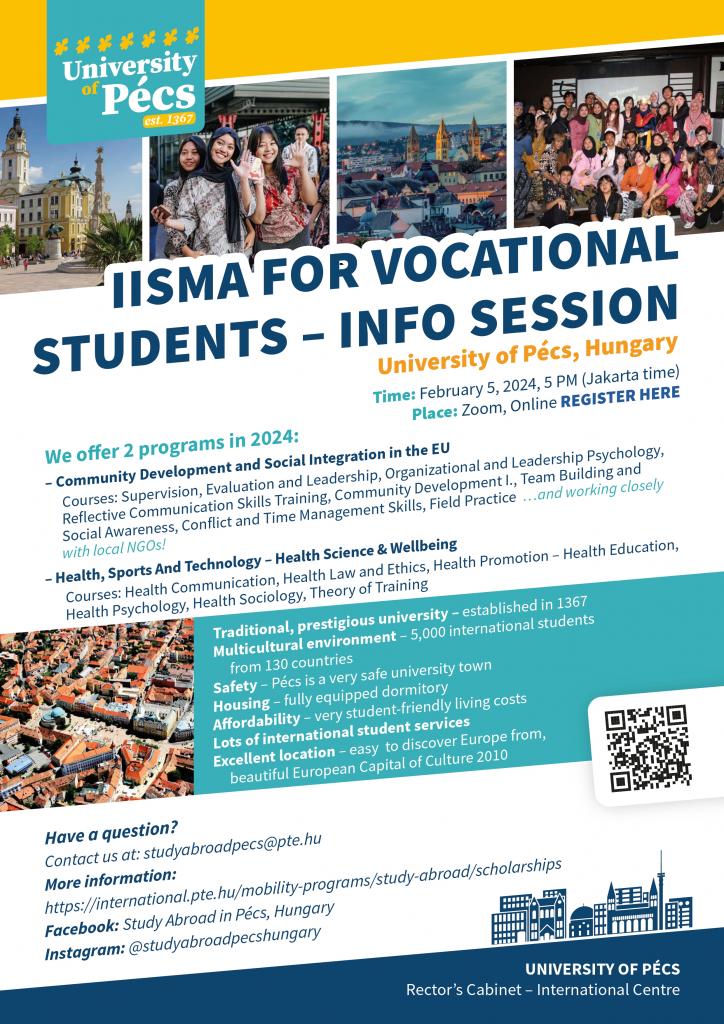
The University of Pécs is delighted to offer programs in Community Development and Social Integration in the EU and Health, Sports And Technology - Health Science & Wellbeing to Indonesian students! Made specifically for the IISMA Vocational program, this one-semester vocational training programme is hosted by the University of Pécs, and its Faculty of Humanities and Social Sciences and Faculty of Health Sciences respectively, and will take place from September to December of 2024.
-
Community Development and Social Integration in the EU
-
This program provides an opportunity to apply knowledge gained in the classroom with supervised practice in the field.
Intensity: 100 acedemic hours (100X45 mins) / 4 months (in September, October, and November, December)
The student is required to spend these 100 hours at the same NGO for an in-depth experience. Some of these NGOs below might not have an English website but all of them are experienced in working with international students.Placements options:
Pécs Community Foundation: working for sustainable development goals in the city
Élmény-Tár Tanoda: working for the equality of chances, promoting the welfare and wellbeing of children living in poverty.
The DRUKKER Community Letterpress: fine arts and pedagogy, applying alternative methods
Power of Humanity Foundation: working for a society for all through the development of civil society, civic education, and democracy building
Round World Foundation: provides daycare for disabled adults who are at least partially self-sufficient, and organizes creative and develomental activities, community programs
Pécsbányatelep Community House: working to develop one of the most deprived parts of Pécs, and to improve the quality of life of the people living there.
Courses in the program:
Supervision, Evaluation and Leadership
Credits: 4 ECTS
The course aims to integrate field experiences with theories and practice models. Students’ field experience is accompanied by team supervision. Students can discuss their experiences and reflect on their professional development. Supervision helps professionals identify and develop their strengths. During this course students learn how to communicate more effectively and how to collaborate with others; how to solve conflicts fairly and constructively; and evaluate their professional activities.Organizational and Leadership Psychology
Credits: 3 ECTS
In the frameworks of the course, students familiarize themselves with the main theories, models, and areas of organizational and leadership psychology and gain comprehensive knowledge of core structures, operations, and processes in organizations. Students completing the course will acquire knowledge of organizational culture, organizational development, leadership, power, motivation, selection, and job analysis.Reflective Communication Skills Training
Credits: 8 ECTS
The course aims to develop reflective/self-reflective skills, communication skills, and cultural competency. Knowledge outcomes: The relevance of social networks in problem formation and problem resolution; verbal and nonverbal communication (functions of communication, communication control, affiliation, axioms of communication); signs and symbols; communication and professional identity; introductory ideas on the theory of mentalization; theories on dialogue.Community Development
Credits: 4 ECTS
The course is an introduction to the theory and methods of community development. Students are familiarized with the international history of community development. Theoretical foundations of the area (as systems theory, relational responsibility, theories of change/social change, network theory, and social capital) are discussed. Practices to develop community capacities are evaluated with respect to their potentials to facilitate networking, social inclusion, citizen participation, the development of social justice and trust; and how all these contribute to build a resourceful social context. Students are enabled to assess a local community by employing developmental research methods; to enter into dialogue with a specific community; to identify and enable potential leaders of a local community so that they could determine their goals and promote change; to strengthen local collaborations and facilitate the formation of alliances among local actors and promote intergenerational co-operation.Team Building and Social Awareness
Credits: 6 ECTS
3 sessions during the semester
Arriving in a new country or starting a new job can be a highly stressful experience for individuals. To navigate these challenges successfully and overcome the cultural shock, it is crucial to foster a supportive group system among team members. This program aims to facilitate the creation of an effective and cohesive group of individuals who may feel disconnected from their new surroundings. Additionally, participants will encounter various human groups through engagement with civil organizations. Understanding the dynamics of privileged and underprivileged groups, as well as the bystander effect, becomes important in these interactions. Participants will also learn how to act proactively and collectively in challenging situations, exhibiting prosocial behavior.Conflict and Time Management Skills
Credits: 6 ECTS
3 sessions during the semester
Two phenomena are prevalent in people’s life regardless of their country of origin or their culture: conflicts and time-related issues. The course is aimed at presenting the various reasons that can lead to the emergence of conflicts either in our private lives or at workplaces. Participants of the program can attempt to identify their typical approaches to conflict resolution with the help of the Thomas-Kilmann model then some methods that can be used to resolve workplace-related conflict situations will be demonstrated. Difficulties of proper time management can be considered universal. The course is designed to reveal some background and possibly hidden causes that can result in less effective time management practices and – in some cases – in procrastination. Some time management hacks whereby participants may be able to improve their time related efficiency will also be presented.Workshops
At the beginning of the program, Indonesian students choose three out of the following thematic areas. Based on their selections, speakers are invited to contribute to the program during its implementation:
- Corporate Social Responsibility
- Use of photo and video methods in community-based projects
- Therapeutic communities (TCs) and recovery movements
- The societal impact of info-communication technologies in a globalised world
- Social aspects of environmental sustainability problems
- Main dilemmas in regional development -
Health, Sports And Technology - Health Science & Wellbeing
-
General information:
During the courses of this programme, students will participate in lectures and practical classes in the field of Health Sciences. The classes take place at the Faculty of Health Sciences classrooms. With the courses, the students will get acquainted with wellbeing, the basics of health promotion, sociology, and the legal and ethical aspects of healthcare. They will have regular visits to Rátgéber Academy, Performance Diagnostics Laboratory of the Faculty of Health Sciences an in the Skill Laboratory of the Faculty of Health Sciences. In this facilities different technologies related to sport/ wellbeing but also with professional sport is will be introduced.
I. THEORETICAL COURSES
Course title: Health Communication I.
Credits: 4 ECTS
Course description: Students get to know the basic concepts and theories related to self-knowledge, self-evaluation, personality typologies, personality development, mental hygiene and communication. Their self-awareness and their ability to self-reflect develop. They learn about the process of communication, the characteristics of verbal and nonverbal communication, the strategies and methods of stress management, as well as the causes and types of conflicts and the methods and styles of conflict management. They become capable of self-reflective analysis and development of their own stress and conflict management.
Learning methodology and evaluation methods: classroom practice, observation of class activity and attitude, self-knowledge/self-knowledge development self-reflection based on the aspects specified in the course process
Course title: Health Law and Ethics
Credits: 6 ECTS
Course description: A thorough overview of the legal history and practice of ethics and jurisprudence, with particular emphasis on the interface between ethics and law. The history of medical ethics. The evolution of its values (from the Greeks to the present). Basic categories of bioethics. Law in life. Different conceptions. E.g. problems of euthanasia, abortion, capital punishment, biogenetics, ethical implications of the technical revolution brought about by the scientific impact of the 4th industrial revolution, ethical analysis of the future. Responsibility for oneself and others. Alcoholism, drug abuse, suicide. Ethical issues in health systems.
Course title: Health promotion-health education, health psychology I
Credits: 5
Course description: The aim of the course is to introduce students to the foundations of personality psychology and health psychology and their interrelationship, the typical stages of the human life course, the specificities of health behaviour and the personal and social experiences of illness, the relationship between stress and burnout. Throughout the course, students will understand and master concepts and their interrelationships, theories and models that can be applied in their future work to understand clients, plan interventions and work effectively together.
Learning methodology and evaluation methods: The student prepares a presentation on the pre-agreed topic.
Course title: Health Sociology
Credits: 6
Course description: During the semester the students get to know the main research areas of sociology, paying special attention to the features and tension areas of Hungarian social problems. With the help of the acquired theoretical and methodological knowledge we give the opportunity to students to be able to recognise and consider those factors in an adequate way that can play role in arising, lingering as well as solving of problems of those people who belong to different social groups and have different social backgrounds.
Learning methodology and evaluation methods: lecture ending with exam
Course title: Theory of Training
Credits: 6
Course description: The aim of the course is to familiarize students with the physiological effects of physical stress, the main elements of cardiorespiratory adaptation, the correlations of conditioning capabilities, the possibilities of developing strength, speed, endurance and flexibility, in order to explain and understand the activities and interventions related to movement in their later studies. Learn about the benefits of regular physical activity and sporting lifestyles and apply them to prevent and rehabilitate the most important cardiovascular, locomotor and neurological diseases. Obtain practical skills in assessing the effects of physical activity, sport-like workouts, learning about ergometric procedures and performance characteristics that are most commonly used in patient and healthy testing. Learn the practical knowledge of regular physical activity, be familiar with emergency situations and first aid for injuries.
Learning methodology and evaluation methods: practical course grade
II. PRACTICAL COURSES
General information: In the programme, students will get familiar with health, healthy lifestyles and sports: practical activities will be organized for the students to get an insight into physical activities as part of a healthy lifestyle, as well as into professional sports.
Locations:- Rátgéber Basketball Academy
- Skill Laboratory of the Faculty of Health Sciences.
- Performance Diagnostics Laboratory of the Faculty of Health Sciences
Duration: weekly basis (for approximately 2x45 minutes sessions),
Facitities of the Practical Courses
Rátgéber Academy – National Basketball Academy of Pécs
Location: H-7632, Pécs, Megyeri út 7, https://www.ratgeberakademia.hu/
Activity: scientific activity, research, education, training, skills development, knowledge dissemination, Pécs and South Transdanubia region basketball training centre for youth and sports professionals, promoting equal opportunities for disadvantaged groups (creating sporting and training opportunities for people with disabilities in the sport of basketball)
Short description: Rátgéber Academy has been created to create a centre of excellence that offers unique conditions for the development of its players. Since its creation, the Academy has been involved in educational, scientific, and sports management acitvities in the Transdanubia region of Hungary.
Skill Labratory
Location: H-7632, Szepesy 1-3, www.szimulacio.pte.huThis was one of the largest developments of the Faculty of Health Sciences, (legal name Human Patient Simulation Center of Health Sciences) has been welcoming students and lecturers participating in bachelor's and master's programs since 2020. Due to the COVID pandemic, its official handover took place on July 8, 2021 in the context of a large-scale ceremony. According to our mission, with the infrastructural, simulation and educational technology opportunities provided by the Center, we provide the scene for the practical education of nurse and paramedic training within the classroom framework, which is supported by the most modern medical technology devices. Our classrooms are suitable for classic skill-type (practice of a sub-skill), demonstration-type and simulation-type education according to the curriculum networks and the needs of the instructors. Our simulation spaces have been designed and equipped in a hyper-realistic way so that our students can experience the performance of tasks either at home, pre-hospital or in a hospital environment.
The goal is to provide a field for training where our students can develop their acquired theoretical knowledge into practical skills in a stress-free environment in order to become dedicated and professional assistants to their patients, using the most modern procedures in health science during their work.
Performance Diagnostics Laboratory
Location: H-7632, Vörösmarty 2. www.etk.pte.huThe fundamental goal of the research conducted in the laboratory is the complex examination of the effects of physical activity in the field of health preservation, health promotion and rehabilitation.
In the laboratory, ergospirometric assessment of elite athletes, hobby athletes and the non-athlete population takes place, for different purposes. In the case of elite athletes and hobby athletes, we perform a performance diagnostic assessment to determine the fitness status of the cardiovascular and respiratory system, which is always preceded by an echocardiogram to rule out contraindications. During the examination, we continuously monitor changes in heart rate, breathing and blood pressure. The output of the measurement includes data related to aerobic and anaerobic fitness, as well as metabolic characteristics. Based on these, training can be optimized and deficiencies can be corrected. In the case of athletes, if requested, based on the data of the measurements, we give advice on how to change the training plan in order to maximize and safely increase the athlete's performance. The survey of the general population is carried out in a similar way, with an easier-to-implement protocol, and we give them dietary and exercise management advice based on the measurements. In the case of population studies, questionnaire surveys on physical activity are supplemented with objective measurements (anthropometry, body composition, body composition, full body scanning, accelerometer movement patterns).
At the University of Pécs we offer the following student services to IISMA awardees:
- airport transfer
- mentor program
- Hungarian language and culture class
Besides which all other student services and facilities of the university are accessible to them, just like to any student enrolled in a full degree program - including but not limited to: psychology coulselling, services for students with special needs, legal aid clinic, orientation days, dormitory student service, academic support, ect.
Academic calendar for the fall semester:
From the first week of September until the end of December (4 months)
English languagerequirements – minimum scores:
IELTS: 5.5
TOEFL: 72
Duolingo: 100
